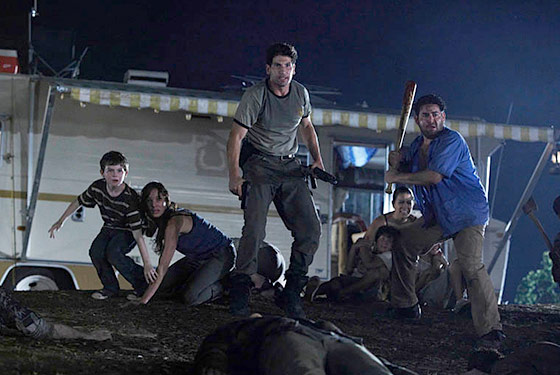
Last week, Walking Dead’s six-episode season crossed the halfway mark with an episode that was low on zombies and high on human dramatics. And one question lingered: How long can you go on a zombie series without killing off any humans?
In episode four of AMC’s fancy zombie show, we finally get to see some humans get eaten. It’s about time. This whole surviving-the-zombified-apocalypse thing was just seeming too easy. The zombies on this show have seemed gross, yes, but not terribly threatening — if only because we’ve seen plenty of them splattered to giblets, but none of them actually lay a fetid hand on a living being. Finally, we get some action.
The episode starts with a fishing trip. You know what sucks? When it’s your birthday, and you go fishing with your sister, you and your sister are having an argument about whether or not your dad tied fishing knots in a certain way and it ends in a cheap epiphany: ”You think he did it for us?” Andrea, the big sis asks. Little sis Amy replies: “Because he knew we were so different … He knew that you needed to catch the fish … and that I needed to throw them back … ” Then big sis says, “Remember his rule: No crying in the boat, it scares away the fish.” And then they get a bite on the line (of course). For this cornpone scene to happen on your birthday is bad news, but for these lines to be your nearly last words? Ugh. And when Amy gets bitten by two zombies at the end of the episode, she doesn’t even get a really grisly death: The actual violence of it just seemed awkward and obviously fake. Amy’s body has to be perfectly still in each shot for the effects crew to do their old-school movie (not-so-magical) magic. Poor Amy.
The overall arc — survivors feel guilty and attempt to retrieve the man (Merle) and guns and walkie-talkie they left behind makes a rough sort of sense, but the details seem to fall apart like so much decomposing flesh. It would be easy to brush off the contrived situations of this episode as genre setups for gore and shocks and chills — if the episode weren’t also quoting William Faulkner at length and trying to jerk dead-dad tears from the audience. It’s as if the show just slows down in these Big Moments for ponderous drama (the sisters on the fishing boat, the talk by the camp fire) and then leaps back into action for Zombie Action with little transition. Hopefully, the show will figure out a way to blend the two more naturally. The premise is still promising.
For now, to lurch from one extreme to the other so quickly takes its own special kind of logic: Not human logic, or anything that makes sense in that old-fart human way, but some new sort of zombie logic. As in, every time you question the show, fans say, “It’s just a zombie show, calm down.” Or: “It’s brilliant! You just don’t understand: It’s a zombie apocalypse out there. People don’t behave, well, like people anymore.”
A few examples: Why did Rick leave his family not just so soon, but immediately after finding them? Zombie logic. Why did Daryl decide to carry the hand Merle decided to leave behind? Zombie logic. Why does Daryl say that Merle “could crap out nails” Jim say that Rick is “tough as nails” within minutes of each other? Zombie logic. Why did the gang members decide to kidnap Glenn and leave their friend if they were, actually, really nice senior-citizen caretakers? Zombie logic. Why did everyone put down their guns when the sweet abuela entered the room? Zombie Logic. Why did Rick and his pals decide to jog back to camp — and not steal another car after the van was stolen — since it was so easy to steal two vehicles in episode two? Zombie logic. Why does Dale suddenly quote The Sound and the Fury’s bit about time being the “mausoleum of all hope and desire” and why does the vatos’ leader, a former janitor, say stuff like, “I don’t think you appreciate the gravity of the situation” and “Felipe gets an arrow in the ass and you want a discussion; You fascinate me”? Zombie logic. And, most important, why is Jim, the grave-digging kook, actually psychic? Zombie logic.
One problem with The Walking Dead, so far, is that the dialogue has been over-the-top and the violence has been relatively straight-forward. Maybe it should be the other way around. But we’re still just four episodes in, and Dead delivers the thrill of old-school zombie kills on cable TV: That, at least, is something we haven’t seen before. So far, the rest of the show feels all too familiar.

